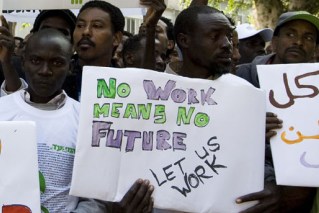 Photo by Meged Gozani, Activestills
Photo by Meged Gozani, ActivestillsAhead of a discussion that is scheduled for tomorrow (29 May 2012) in the Knesset Committee on Internal Affairs, human rights organizations sent a letter to Knesset Speaker Reuven Rivlin, stating that they do not intend to participate in this meeting due to the fact that several of these recent meetings were used not for a constructive and practical debate, but rather for wild incitement against asylum seekers and human rights organizations.
The organizations that sent the letter – the Association for Civil Rights on Israel (ACRI), Hotline for Migrant Workers, Assaf – Aid Organization for Refugees and Asylum Seekers in Israel, and Amnesty International – Israel – stated that should a discussion be held, under the auspices of the Knesset Speaker, in which there will be no room for inciting speech, they will be happy to participate.
In the letter, the aforementioned organizations also briefly explain their position regarding asylum seekers in Israel, including the existing and the desired government policies on this matter.
A translation of the full letter to English is below.
May 28, 2012
To:
MK Reuven Rivlin
Speaker of the Knesset
Jerusalem
Dear Sir,
Re: Wild Incitement against Asylum Seekers and Human Rights Activists by Members of Knesset
We have been invited by the Committee on Internal Affairs and on the Environment to participate in a meeting scheduled for tomorrow, May 29, 2012. The meeting is due to discuss proposals for accelerated debates initiated by MKs Danny Danon, Miri Regev and Amnon Cohen, relating to what they define as “crime rate among the infiltrators;” “the problem of the infiltrators, phenomena of violence, and failure to enforce the law;” and “the police struggle to combat the phenomenon of crime among infiltrators.”
As you know, we have the greatest respect for the Knesset and its institutions, and attach great importance to attending various committee meetings to which we are invited. On this occasion, we have decided not to participate in the meeting.
In recent months, we have attended several meetings on the subject of asylum seekers in Israel. Regrettably, we have learned that these meetings are no more than a further platform for wild incitement against asylum seekers and human rights activists by Members of Knesset, among them those who have initiated this meeting. We prefer not to play the role of a backdrop for those who engage in incitement and, accordingly, we will not participate in the meeting.
We wish to note our satisfaction with your comments on May 24, 2012 – expressing your discontent with the fanning of flames on this matter, and we join your demand that the government formulate policy and solutions.
We, too, believe that the steps decided by the Israeli government have thusfar not met the needs of those who are present today in Israel and whom there is no intention to deport from Israel in the foreseeable future. Neither do these steps meet the needs of the residents of the areas in which the asylum seekers live. Instead of adopting solutions to reduce distress and cool inflamed passions, we hear provocative comments that serve only to encourage fear and hatred.
There are several tens of thousands of asylum seekers in Israel today; most of them are Eritreans and a significant minority are from Sudan. Israel does not deport Eritreans or Sudanese because of the danger they face. We hope that the situation in Eritrea and Sudan will improve, enabling the citizens of these countries to return to their homes. However, Israel must accept the realistic probability that a significant number of asylum seekers will not leave Israel over the coming years.
Asylum seekers currently live in Israel while facing pending deportation orders that cannot be enforced. Their employment in Israel is regulated by means of a policy of “non-enforcement” against their employers. Asylum seekers hold residency permits specifically stating that the permits do not entitle the holders to work, and many of them are indeed unable to do so.
This policy denies asylum seekers opportunities for securing employment, condemns them to poverty and deprivation, and encourages exploitation and abuse. As a result, concentrations of asylum seekers have developed in disadvantaged areas in which they can find affordable shelter. This geographical concentration exacerbates the existing problems in these areas, creating an intolerable situation.
We believe that solutions can be found to these problems. The Israeli government should enable asylum seekers to work and should ensure that they have access to health services. These steps will help the asylum seekers to break out of the cycle of deprivation, disperse this population more widely, and reduce the burden on underprivileged areas. Investments should be made in the neighborhoods where the asylum seekers live in order to improve the infrastructures for all their residents. Alongside all these actions, a genuine process should be undertaken to examine the asylum requests and recognize refugees.
If a discussion is held under your auspices, at which no room will be granted for wild incitement, we will be pleased to participate.
Sincerely,
Hagai El-Ad
Association for Civil Rights in Israel (ACRI)
Reut Michaeli, attorney
Hotline for Migrant Workers
Alaa Khatib
Kav LaOved
Ran Cohen
PHR-Israel
Michal Pinchuk
ASSAF
Yonatan Gher
Amnesty International Israel
CC: Members of the Knesset Committee on Internal Affairs and on the Environment








One Response to NGOs Refuse to Participate in Knesset Meeting Used for MK Incitement against Asylum Seekers